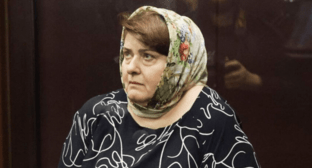07 September 2020, 15:00
Week in the Caucasus: review of main events of August 31-September 6, 2020
Coronavirus infection spread statistics in the Caucasus; mourning events in connection with the anniversary of the terror act in Beslan; Day of Knowledge with enhanced sanitary measures; scheduling of parliamentary elections in Georgia, – see the review of these and other events in the Caucasus during the week of August 31-September 6, 2020, prepared by the "Caucasian Knot".
Coronavirus infection spread statistics in Caucasus
Over the past week, Armenia still leads in Southern Caucasus in both the number of coronavirus-infected patients and the COVID-19 death toll. Meanwhile, over the past week, Armenia also came out on top in terms of an increase in the number of coronavirus-infected people and thus took over Azerbaijan which led in terms of the above parameter. By the evening on September 6, the number of coronavirus-infected people in Armenia reached 44,783 (1033 new cases over the week), in Azerbaijan – 37,329 (1020 new cases over the week compared to the previous number of 36,309 cases), in Georgia – 1650 (58 new cases over the week compared to the previous number of 1469 cases), in Nagorno-Karabakh – 312 (19 new cases over the week compared to the previous number of 287 cases), in Abkhazia – 516 (73 new cases over the week compared to the previous number of 315), and in South Ossetia – 90 (no new cases over the week). By 8:00 p.m. Moscow time on September 6, Armenia registered 897 deaths from COVID-19, Azerbaijan – 548, Georgia – 19, Abkhazia – 5, and Nagorno-Karabakh – 2.
The number of coronavirus-infected patients is also increasing in regions of Southern Russia. While by the evening on August 30, it was reported about 98,982 coronavirus-infected patients in all the regions of Southern Russia, then by the evening on September 6, their total number reached 104,712 (5730 new cases over the week). Over the past week, the Rostov Region still leads in the number of coronavirus-infected patients, where 17,785 cases were registered. The Stavropol Territory, where 12,754 coronavirus-infected patients were detected, took the second place. The Volgograd Region with 12,709 coronavirus-infected patients found itself at the third place.
Over the week, the coronavirus death toll also increased: from 1789 to 1892 (103 new cases of death over the week). During the week, according to the sad death toll statistics, Dagestan still leads in the region: the republic has already registered 507 COVID-19 deaths since the beginning of the pandemic. Dagestan is followed by the Rostov Region where 373 COVID-19 deaths have been already registered, and the Stavropol Territory with 250 COVID-19 deaths stays at the third place in the sad death toll statistics.
Mourning events in connection with anniversary of terror act in Beslan
This year marks the 16th anniversary of the day when terrorists took 1128 hostages in a gym of the Beslan school No. 1. The special operation to release the hostages lasted three days and ended on September 3, 2004. As a result of the terror act, 334 people were killed, including 186 children, and other 810 people were injured. In this regard, in North Ossetia, schools postponed the Day of Knowledge to September 4, and starting from September 1, a three-day watch was held in memory of the victims killed in the terror act. In the school gym where the hostages were held, candles were lit near the photographs of the deceased hostages, and people carried toys and water to the school yard in memory of the fact that the terrorists had not let the hostages drink during three days. On the eve of the mourning events, a new art object appeared in Beslan: a composition of 186 knitted poppies, marking the number of children who were killed in the terror act. According to Fatima Kusova, an author of the art object, understanding of the tragedy through creativity helps to survive it. People took part in the mourning ceremony in Beslan without complying with the restrictive measures in force in the republic because of the spread of the coronavirus infection. Participants of the mourning ceremony in Beslan called on people to remember the victims of the terror act. The society remembers the hostage-taking in the Beslan school the despite the state-run administration intends to hush it up, writes Olga Allenova, an author of the book "Outpost. Beslan and Its Hostages," on the 16th anniversary of the terror act. The investigation into the criminal case on the Beslan terror act is being formally extended, but there is no real progress in it, and investigators refused to attach to the case the findings of the European Court of Human Rights (ECtHR), say on the anniversary of the terror act Aneta Gadieva, the co-chair of the "Mothers of Beslan" Committee, and Fatima Mamaeva, a mother of a schoolgirl killed during the assault of the school building. Russia ignores the findings of the ECtHR and refuses to investigate the circumstances that led to numerous casualties among the hostages, activists Ella Kesaeva and Aneta Gadieva claim. The Russian authorities are to comply with the decision of the Strasbourg Court in full, not limited to the payment of compensation, lawyers interviewed by the "Caucasian Knot" note.
Day of Knowledge with enhanced sanitary measures
On September 1, in all Russian regions, except for North Ossetia, schools returned to full-time education and were opened for pupils. Sanitary measures are strengthened in schools because of the spread of the coronavirus infection: sanitizers for disinfection are installed at the entrances to school buildings and in classrooms, pupils are subjected to remote measurement of temperature, and the schedules of lessons and breaks are regularly changed to ensure that children have less contact with each other. On the Day of Knowledge, in Dagestan, almost all schoolchildren came to classes. According to principals of local schools, in order to reduce the risk of the coronavirus infection, they had to cancel solemn gatherings at schools on September 1, rearrange the class schedule, and strengthen sanitary measures. In Kabardino-Balkaria, schools did not abandon the solemn gatherings dedicated to the beginning of the new academic year, but they were organized only for first -form schoolchildren. The Stavropol Territory also held solemn gatherings for first-formers, with parents of schoolchildren not allowed to attend the festivities.
Scheduling of parliamentary elections in Georgia
On August 31, Georgian President Salome Zurabishvili signed a decree scheduling elections to the country's parliament and the Supreme Council (SC) of the Adjara Autonomy for October 31. On September 4, the press service of the Central Election Commission (CEC) of Georgia announced the completion of the registration of parties running to participate in the elections. Out of 78 parties which applied to the CEC, 66 were registered. It should be noted that on September 3, the parliament of Georgia quickly adopted amendments to the Electoral and Criminal Codes, which prohibited coercion, intimidation of voters in elections, or violation of the secrecy of the voting. According to the adopted amendments, the above violations will, in particular, be punished with a fine or house arrest for up to six months or imprisonment for up to three years. Analysts argued about the background for the adoption of those amendments. Human rights defender Vladimir Bozhadze associates the tougher punishment for pressure on voters with the desire of the Georgian authorities to prevent protests from the opposition after the parliamentary elections. In turn, political analyst Ramaz Sakvarelidze argues that if oppositionists need an excuse to go out to protest actions, they will do it without any pretext.
This article was originally published on the Russian page of 24/7 Internet agency ‘Caucasian Knot’ on September 7, 2020 at 09:11 am MSK. To access the full text of the article, click here.




